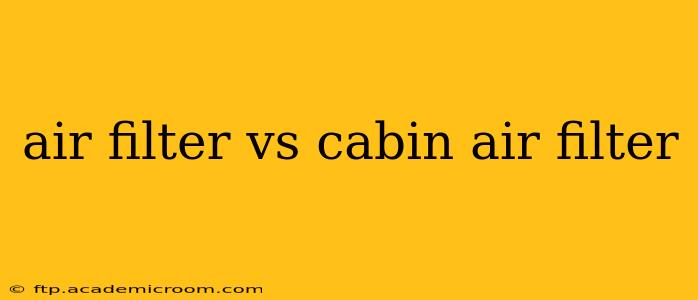Choosing the right filters for your vehicle is crucial for both performance and health. While both air filters and cabin air filters are essential for your car's well-being, they serve very different purposes. This article will clarify the distinctions between these two vital components, helping you understand their roles and importance.
What is an Air Filter?
The air filter, also known as the engine air filter, is located under the hood of your car. Its primary function is to protect your engine's vital components from dust, dirt, pollen, and other airborne debris. These contaminants, if allowed into the engine, can cause significant damage, leading to reduced performance, decreased fuel efficiency, and even costly repairs. The air filter cleans the air before it reaches the engine, ensuring only clean air is used in the combustion process. A clogged air filter restricts airflow, impacting engine performance and potentially harming the engine over time. Regular replacement, usually every 12,000-15,000 miles (or as recommended in your owner's manual), is essential for maintaining optimal engine health.
What is a Cabin Air Filter?
The cabin air filter, also called an in-cabin air filter, is situated inside your vehicle's ventilation system, typically behind the glove compartment or under the dashboard. Its role is entirely different from the engine air filter – it focuses on improving the air quality inside your car's cabin. This filter prevents pollutants like pollen, dust mites, mold spores, and other airborne particles from entering the ventilation system and circulating throughout the vehicle's interior. A clean cabin air filter ensures cleaner, fresher air for the occupants, which is especially beneficial for allergy sufferers and those with respiratory sensitivities. It also helps prevent unpleasant odors from entering the car. Replacement frequency varies depending on driving conditions and filter type, but typically ranges from 12,000 to 20,000 miles. Check your owner's manual for specific recommendations.
What Happens if I Don't Replace My Air Filters?
Neglecting to replace either filter can have significant consequences.
Consequences of a clogged engine air filter:
- Reduced engine performance: Restricted airflow leads to a loss of power and acceleration.
- Decreased fuel efficiency: The engine has to work harder to compensate for the restricted airflow, resulting in lower gas mileage.
- Increased engine wear: Contaminants can damage engine components, leading to premature wear and tear.
- Potential engine damage: Severe clogging can cause serious and costly engine damage.
Consequences of a clogged cabin air filter:
- Reduced air quality: Poor air circulation can lead to unpleasant smells, dust, and allergens circulating within the car.
- Worsening of allergies and respiratory problems: Allergens and pollutants can exacerbate existing health conditions.
- Musty odors: A dirty filter can cause a build-up of mold and mildew, resulting in unpleasant odors.
- Reduced heating and cooling efficiency: A clogged filter can restrict airflow, hindering the effectiveness of your climate control system.
How Often Should I Replace My Air Filters?
The recommended replacement intervals for both air filters vary depending on your vehicle's make and model, as well as your driving conditions. Consult your owner's manual for the manufacturer's suggested replacement schedule. However, generally:
- Engine air filters: Typically replaced every 12,000 to 15,000 miles.
- Cabin air filters: Typically replaced every 12,000 to 20,000 miles, or even more frequently in dusty or polluted environments.
Always visually inspect your filters regularly. If they appear visibly dirty or clogged, replace them sooner than the recommended interval.
How to Tell if My Air Filters Need Replacing?
Both filters show signs when they need replacement. For the engine air filter, look for dirt, debris, and restricted airflow. For the cabin air filter, look for visible dirt and a musty odor. If you're unsure, consult your owner's manual or a qualified mechanic.
Are Air Filters and Cabin Air Filters the Same?
No, air filters and cabin air filters are not the same. They have distinct locations, functions, and replacement schedules. The engine air filter protects the engine, while the cabin air filter protects the occupants.
By understanding the differences and importance of both air filters, you can ensure optimal performance for your vehicle and a healthier driving experience. Regular maintenance of these vital components will contribute to the longevity and efficiency of your car and the well-being of its passengers.
